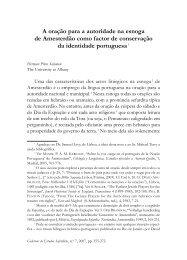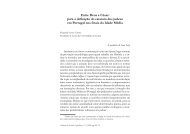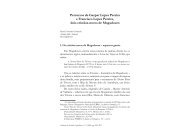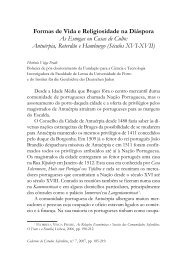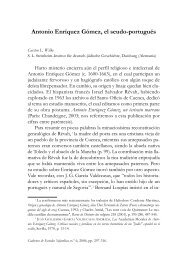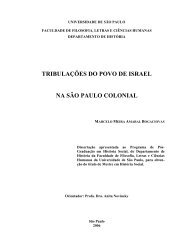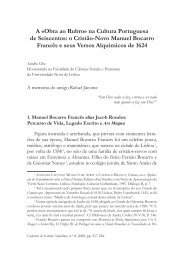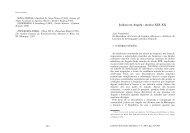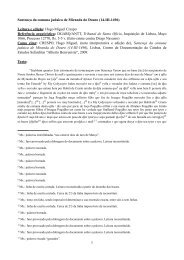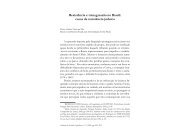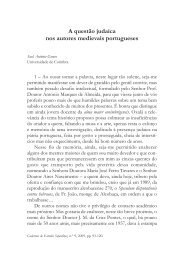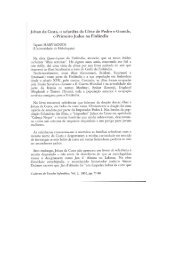Pagina 1-28.qxd - Cátedra de Estudos Sefarditas "Alberto Benveniste"
Pagina 1-28.qxd - Cátedra de Estudos Sefarditas "Alberto Benveniste"
Pagina 1-28.qxd - Cátedra de Estudos Sefarditas "Alberto Benveniste"
Create successful ePaper yourself
Turn your PDF publications into a flip-book with our unique Google optimized e-Paper software.
Pag 33-62:<strong>Pagina</strong> 1-<strong>28.qxd</strong> 10-12-2009 01:13 Page 59<br />
KIng ManUel I anD tHe exPUlSIOn OF tHe CaStIlIan ConvERSoS anD MUSlIMS...<br />
ulated himself that “[the forced conversion in Castile] was carried<br />
out and accomplished, as was promised, with the praise of god<br />
and to our great pleasure and benefit”. 52<br />
the lengthy periods of time that were necessary for negotiations<br />
between Portugal and the Papal Curia means that it is obvious<br />
that Manuel I had <strong>de</strong>termined to obtain crusading bulls such as<br />
Re<strong>de</strong>mptor noster and Ineffabilis et Summi in the first months of his<br />
reign, when he sent his ambassador Pero Correia to Rome. Once it<br />
was clear that the expulsion of the Jews was an unavoidable com -<br />
pro mise in or<strong>de</strong>r to secure a new dynastic alliance with Castile, it<br />
seems likely that the King then also seized the opportunity to<br />
enhance his image as a Christian king by expelling the Muslim<br />
minority as well. the relatively small size of the Muslim population<br />
in Portugal, and its consequently limited importance to the Portuguese<br />
economy, ma<strong>de</strong> the expulsion of this minority far less of an<br />
economic sacrifice than the expulsion of the Jews. 53 another aspect<br />
of the problem that must not be ignored is the way in which the<br />
expulsion of the Muslim minority coinci<strong>de</strong>d with King Manuel’s<br />
personal vision of Christian kingship. Professor thomaz has<br />
pointed out that his unlikely succession to the throne of Portugal<br />
prom pted King Manuel to firmly believe that he had been appoin -<br />
ted by god to wage war against His enemies on earth: the follow-<br />
52 “… saiba vossa sanctida<strong>de</strong> que quando se contrattou casamento entre nós, & ha Rainha nossa<br />
muita amada molher nisto prinçipalmente insistimos, & houuemos por mais bemauenturado dote, pedirmos<br />
aho dito Rei nosso pai que nam somente todalas mezquitas dos Mouros sogeitas aho Regno <strong>de</strong> Castella<br />
has mandasse todas <strong>de</strong>stroir, mas que ainda hos seus filhos pequenos, & <strong>de</strong> pequena ida<strong>de</strong> fossem<br />
tirados <strong>de</strong> seus pais, & se baptizassem, & que hos tornassem Christãos. Ha qual cousa, assi quomo foi<br />
prometida, assi com louuor <strong>de</strong> Deos se acabou, & cõprio, no que reçebemos grã<strong>de</strong> prazer, & benefiçio.”<br />
Damião <strong>de</strong> góis, Crónica do Felicíssimo Rei D. Manuel (Coimbra, 1949), Vol. 1, chapter 93,<br />
224-7; DaMIãO De góIS gives an accurate Portuguese translation of the original latin<br />
work: Manuel I of Portugal, Epistola ad summum romanum pontificem (lisbon, 1505). this<br />
passage refers to the second marriage of Manuel to the Infanta Maria of Castile in 1500.<br />
53 On the size and economic importance of the Muslim minority in medieval Portugal<br />
in comparison to the Jewish minority see F. SOyeR, The Persecution of the Jews and Muslims<br />
of Portugal. 41-6 and 72-7.<br />
59



